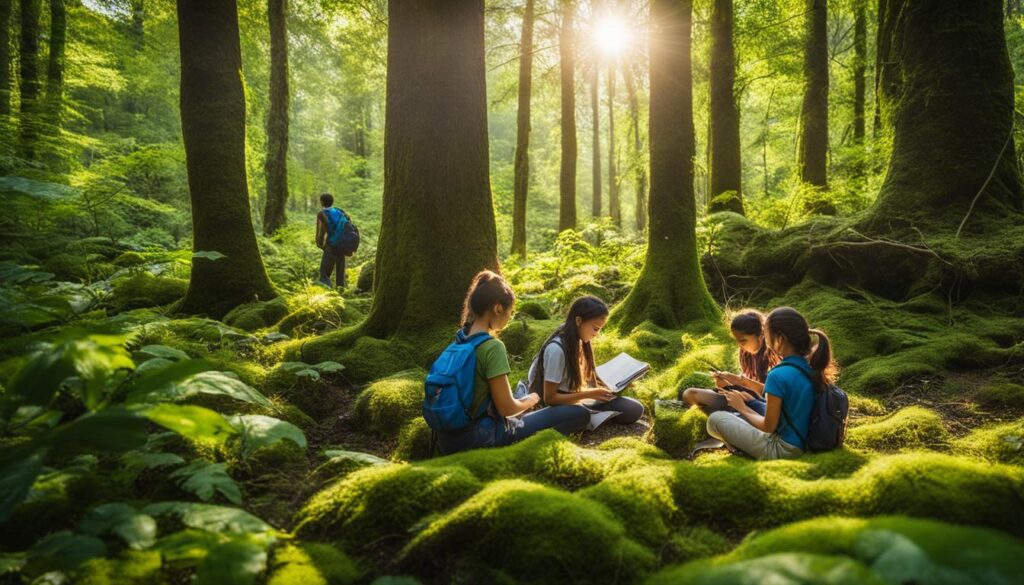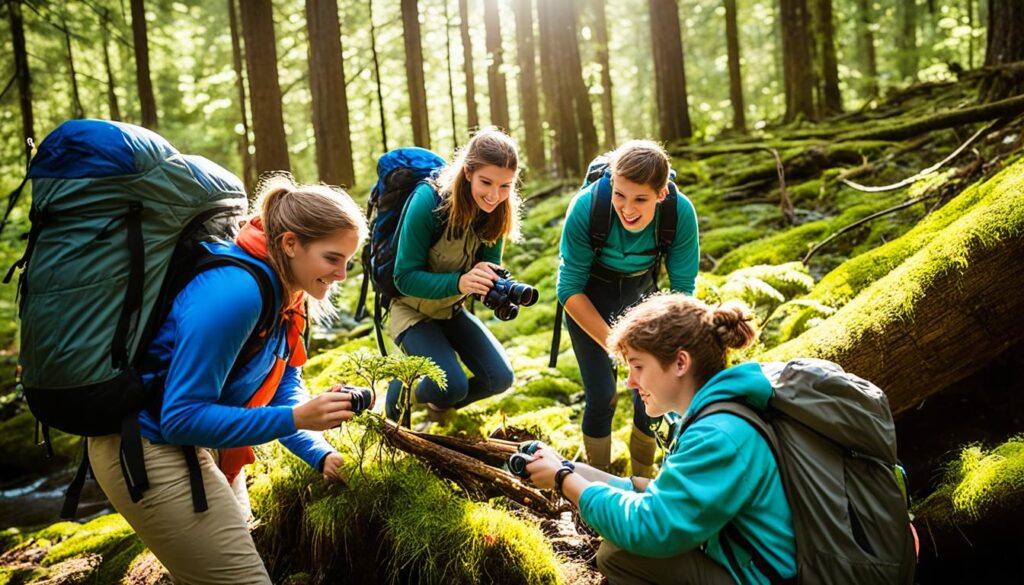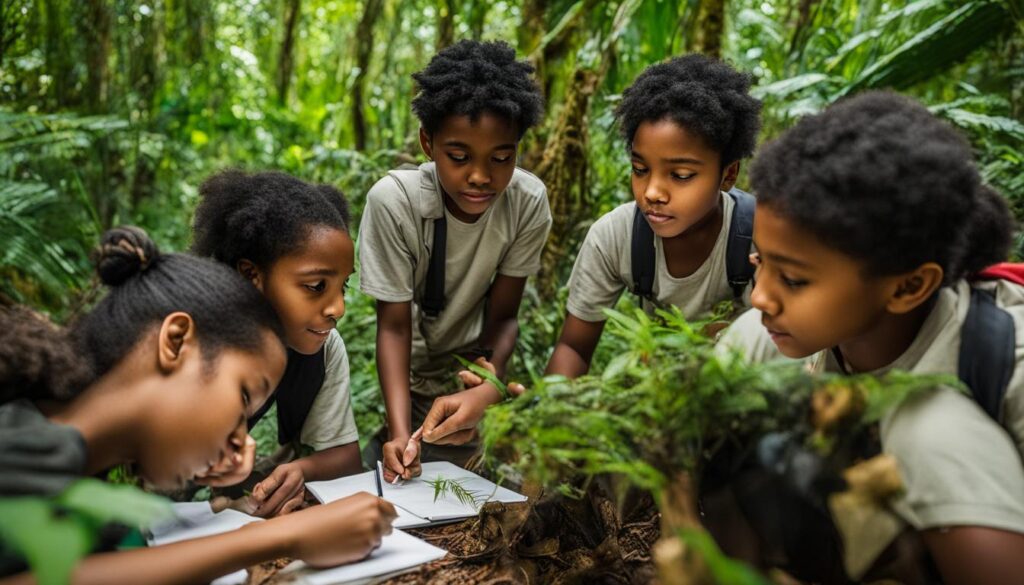Welcome to our blog post on outdoor explorations and its role in inspiring curiosity and discovery in students. When students step out of the confines of the classroom and into the great outdoors, they embark on a journey of hands-on learning experiences that ignite their sense of curiosity and open doors to new discoveries. Whether it’s exploring the wonders of nature, engaging in adventurous activities, or integrating technology with outdoor education, the power of outdoor learning is undeniable.
Outdoor explorations provide students with the opportunity to connect with the natural world, sparking a passion for learning and instilling a lifelong appreciation for the environment. Through various outdoor activities, students develop not only cognitive abilities but also emotional growth, physical development, curiosity, critical thinking, and environmental stewardship.
In this blog post, we will delve deeper into the significance of outdoor learning adventures education, discover the cognitive benefits of outdoor education, explore how nature-based education nurtures emotional growth, highlight the impact of outdoor activities on physical development, delve into the role of outdoor explorations in fostering curiosity and critical thinking, examine the connection between students and natural environments, discuss the integration of outdoor learning curriculum, emphasize the importance of environmental education and stewardship, and explore the incorporation of technology in outdoor education.
Key Takeaways:
- Outdoor explorations inspire curiosity and foster a sense of discovery in students.
- Engaging in hands-on learning experiences in natural settings enhances cognitive abilities and critical thinking skills.
- Nature-based education nurtures emotional growth and fosters a sense of environmental stewardship.
- Outdoor activities promote physical development and an active lifestyle.
- Outdoor learning adventures encourage curiosity, problem-solving skills, and imaginative play.
The Significance of Outdoor Learning Adventures Education
Outdoor learning adventures education plays a significant role in the holistic development of students. Through adventurous learning experiences, students can build strong neural connections in their brains, enhancing their cognitive abilities and critical thinking skills. Outdoor educational programs provide support for a child’s overall development, fostering social skills, emotional growth, and resilience. Additionally, engaging in outdoor learning in natural settings can ignite a lifelong joy for learning, instilling a love and appreciation for the environment.
Building Neural Connections through Adventurous Learning
Adventurous learning experiences in outdoor settings offer unique opportunities for students to develop and strengthen neural connections in their brains. When students actively explore the natural world, their senses and cognitive abilities are engaged, creating new connections between brain cells. This process enhances their ability to think critically, solve problems creatively, and make connections between different areas of knowledge. By building these neural connections, outdoor learning adventures education nurtures intellectual growth and fosters a deep understanding of the world around them.
Supporting Child Development with Outdoor Educational Programs
Outdoor educational programs provide a supportive environment for the holistic development of children. Through hands-on activities and experiential learning, students develop essential social and emotional skills. Collaborating with their peers in outdoor settings fosters teamwork, communication, and problem-solving abilities. Additionally, exposure to nature enhances emotional well-being and resilience, promoting healthy development of self-esteem and self-awareness. Outdoor educational programs create a nurturing space where children can thrive and grow in various aspects of their lives.
Igniting a Lifelong Joy for Learning in Natural Settings
Engaging in outdoor learning adventures in natural settings has the power to ignite a lifelong joy for learning. When students explore the wonders of nature, their natural curiosity is sparked, and they develop a deep appreciation for the environment. The joy and sense of wonder experienced in nature can inspire a lifelong love of learning, as students become motivated to explore, discover, and seek knowledge not only in the classroom but also in the world around them. Outdoor learning adventures education cultivates a passion for learning that extends beyond formal education, empowering students to continue discovering and growing throughout their lives.
Discovering the Cognitive Benefits of Outdoor Education
Outdoor education offers numerous cognitive benefits for students. By engaging in hands-on experiences in natural environments, students can develop a deeper understanding of scientific concepts and processes. Outdoor education promotes critical thinking, problem-solving skills, and creativity as students are encouraged to ask questions, make observations, and formulate hypotheses. These experiential learning opportunities enhance students’ cognitive abilities and foster a lifelong love for learning.
When students engage in outdoor education, they have the opportunity to explore and experiment in real-world contexts. This hands-on approach allows them to apply theoretical knowledge in practical ways, reinforcing their understanding of scientific principles and encouraging critical thinking skills. By observing and interacting with the natural world, students develop a sense of curiosity and wonder that stimulates their cognitive growth.

Outdoor education also provides an immersive learning environment that stimulates creativity. When students are surrounded by nature, they are inspired to think outside the box, generate new ideas, and make connections between different concepts. These creative thinking skills are essential for problem-solving and innovation.
Additionally, outdoor education encourages students to develop their observational skills. By engaging with the environment, students learn to pay attention to details, make careful observations, and draw evidence-based conclusions. This process fosters scientific inquiry and trains students to think critically and analytically.
Furthermore, the experiential nature of outdoor education allows students to learn from their mistakes and develop resilience. When faced with challenges or setbacks, students are encouraged to persist, adapt, and find alternative solutions. This resilience-building process enhances their cognitive flexibility and problem-solving abilities.
In conclusion, outdoor education offers cognitive benefits that go beyond traditional classroom-based learning. By providing students with hands-on experiences in natural environments, outdoor education fosters critical thinking, problem-solving skills, creativity, and cognitive growth. Moreover, it nurtures a lifelong love for learning by fostering curiosity and a deep appreciation for the wonders of the natural world.
Nurturing Emotional Growth through Nature-Based Education
Nature-based education provides a nurturing environment for students’ emotional growth. Connecting with nature has been shown to evoke a sense of wonder, curiosity, and a deeper appreciation for the natural world. By engaging in nature-based activities, students develop emotional resilience, empathy, and a sense of environmental stewardship. Nature-based education fosters emotional well-being and supports the holistic development of students.
“In every walk with nature, one receives far more than he seeks.” – John Muir
- Wonder and Curiosity: By immersing themselves in the beauty of nature, students experience a sense of wonder and curiosity. They are inspired to ask questions, seek answers, and explore the mysteries of the natural world.
- Emotional Resilience: Nature-based education helps students develop emotional resilience as they navigate challenges and setbacks. Being in nature provides a calming and therapeutic effect, allowing students to process their emotions and develop coping mechanisms.
- Empathy and Connection: Interacting with nature fosters a sense of empathy and connection with the environment and living beings. Students develop a deeper understanding of the interdependence of all living things and a sense of responsibility towards preserving the natural world.
- Environmental Stewardship: Nature-based education instills a sense of environmental stewardship in students. They learn about the importance of sustainable practices, conservation, and taking care of the Earth for future generations.
By incorporating nature-based education into the curriculum, educators create opportunities for students to develop essential emotional skills and cultivate a lifelong connection with the natural world.
| Benefits of Nature-Based Education | Emotional Growth |
|---|---|
| Enhanced emotional resilience | ✔️ |
| Development of empathy and connection with nature | ✔️ |
| Promotion of environmental stewardship | ✔️ |
| Stimulates curiosity and wonder | ✔️ |
Physical Development and Outdoor Activities for Students
Outdoor activities are essential for promoting the physical development of students. Through engaging in outdoor exercise, students can maintain a healthy lifestyle while reaping numerous benefits for their overall well-being. Outdoor activities improve cardiovascular fitness, enhance strength and flexibility, and contribute to an active lifestyle.
Promoting Physical Well-Being with Outdoor Exercise
Outdoor exercise plays a significant role in promoting physical well-being among students. By stepping outside and engaging in activities such as running, cycling, hiking, or playing sports, students can improve their cardiovascular fitness, strengthen their muscles, and enhance their flexibility. Outdoor exercise not only contributes to physical fitness but also provides an opportunity for students to enjoy fresh air and natural surroundings.
Enhancing Motor Fitness and Coordination in Natural Environments
Engaging in outdoor activities in natural environments offers unique opportunities for students to enhance their motor fitness and coordination. As students navigate through uneven terrains, climb trees, or maneuver around obstacles, they are challenged to maintain balance, coordination, and spatial awareness. These experiences help develop core strength, agility, and fine motor skills. The natural environments provide a diverse range of sensory stimuli, contributing to the development of students’ sensory-motor integration.
Creating Opportunities for Curiosity and Critical Thinking
Outdoor learning provides a rich environment for students to develop their curiosity and critical thinking skills. Through engaging in adventure-based learning, students are empowered to solve problems, make decisions, and collaborate with their peers. The outdoor environment stimulates imaginative play and fosters scientific inquiry, allowing students to explore, observe, and engage with the natural world. These experiences enable students to develop invaluable problem-solving skills that can be applied to various aspects of life, preparing them for future challenges and opportunities.
Developing Problem-Solving Skills with Adventure-Based Learning
Adventure-based learning is a powerful educational approach that encourages students to step out of their comfort zones and confront challenges. In outdoor settings, students are presented with real-life situations that require them to think critically, evaluate options, and make informed decisions. By engaging in activities such as team-building exercises, orienteering, and outdoor sports, students enhance their problem-solving skills and develop resilience. Adventure-based learning fosters a growth mindset, as students understand that not every problem has a straightforward solution and that learning from failures is an essential part of the process.
Stimulating Imaginative Play and Scientific Inquiry Outdoors
The outdoor environment provides a canvas for students to engage in imaginative play and scientific inquiry. In natural settings, students can explore their surroundings, create imaginary scenarios, and let their imaginations run wild. Through imaginative play, students develop creativity, communication skills, and the ability to think outside the box. Additionally, the outdoor environment serves as a natural laboratory where students can conduct scientific investigations, make observations, and ask questions. Scientific inquiry outdoors instills a sense of curiosity and wonder, encouraging students to explore the mysteries of the natural world and cultivate a lifelong love for scientific exploration.

| Benefits of Adventure-Based Learning and Imaginative Play Outdoors | Benefits of Scientific Inquiry Outdoors |
|---|---|
|
|
Connecting with Natural Environments: Making the Most of Outdoor Classrooms
Outdoor classrooms offer a unique and invaluable opportunity for students to connect with natural environments, creating a rich and immersive learning experience. By venturing beyond the confines of traditional classrooms, students can engage with the wonders of the natural world, deepening their understanding and appreciation of the environment.
Outdoor classrooms provide hands-on experiences that allow students to apply theoretical knowledge to real-world situations. This experiential learning approach fosters a dynamic environment that stimulates curiosity, creativity, and a sense of wonder. Students have the chance to explore, observe, and interact with the natural elements, providing a holistic learning experience.
“The best classroom and the richest cupboard are roofed only by the sky.” – Margaret McMillan
Through outdoor classrooms, students can study ecological systems, observe wildlife, analyze environmental challenges, and engage in activities that promote sustainability and conservation. The outdoor setting offers a myriad of opportunities for cross-curricular learning, integrating subjects such as science, geography, art, and physical education.
By immersing themselves in outdoor classrooms, students develop a deep connection with the natural world, fostering a sense of responsibility and stewardship. They gain a firsthand understanding of the interconnectedness of ecosystems and the impact of human actions on the environment.
| Benefits of Outdoor Classrooms | Opportunities | Outcomes |
|---|---|---|
| Enhanced engagement | Immersive learning experiences | Deeper understanding and retention of knowledge |
| Stimulated curiosity and creativity | Exploration and discovery | Development of critical thinking and problem-solving skills |
| Improved physical and mental well-being | Outdoor exercise and exposure to nature’s calming effects | Promotion of overall health and well-being |
| Nurtured sense of environmental stewardship | Interaction with the natural world | Development of a lifelong commitment to sustainability |
Outdoor classrooms provide a transformative educational experience that nurtures not only academic growth but also personal and environmental awareness. By making the most of these unique learning spaces, educators can inspire a new generation to cherish and protect our natural environment.
Integrating Outdoor Learning Curriculum and Experiential Learning Techniques
Integrating outdoor learning curriculum and experiential learning techniques can greatly enhance the educational experience for students. By incorporating outdoor activities and hands-on experiences into the curriculum, students have the opportunity to apply theoretical knowledge in practical settings, making their learning more meaningful and engaging.
Experiential learning techniques, such as field trips, nature walks, and outdoor experiments, encourage students to actively participate in their own learning journey. This approach fosters critical thinking, problem-solving skills, and a deeper understanding of the concepts being taught. By immersing themselves in real-world scenarios, students are able to connect theoretical knowledge with real-life applications, which in turn enhances their overall learning experience.

Integrating outdoor learning curriculum also helps students develop a range of skills that go beyond traditional classroom-based learning. With hands-on experiences in the outdoors, students are able to develop important skills such as teamwork, communication, adaptability, and resilience. These skills are highly valued in today’s fast-paced and ever-changing world, and by providing students with opportunities to practice and learn these skills in natural environments, they are better prepared for future challenges and opportunities.
Furthermore, integrating outdoor learning curriculum can also foster a deeper connection and appreciation for nature among students. By spending time in the outdoors, students develop a sense of empathy and stewardship towards the environment. They gain firsthand experiences of the importance of conserving and protecting natural resources, paving the way for responsible and sustainable behavior in the future.
Incorporating experiential learning techniques and outdoor learning curriculum not only enriches the educational experience, but it also cultivates a love for learning and encourages students to become active participants in their own education. By providing opportunities for students to learn through exploration and discovery in the outdoors, educators can create a dynamic and engaging learning environment that supports their overall development.
Environmental Education and Stewardship: Cultivating a New Generation
Environmental education and stewardship play a pivotal role in shaping a new generation of environmentally responsible individuals. By providing opportunities for outdoor exploration, students can engage with nature, develop a deep connection with the environment, and learn about sustainable practices. Early childhood is a critical time for fostering a relationship with nature, as it lays the foundation for lifelong environmental stewardship, instilling a sense of responsibility and care for the natural world.
Encouraging Environmental Responsibility through Outdoor Exploration
Outdoor exploration is key to promoting environmental responsibility in students. When exposed to natural environments, students experience the beauty and complexity of the world around them, fostering a deep appreciation for nature. Through hands-on experiences, they learn about the interdependence between humans and the environment, understanding how their actions impact the delicate balance of ecosystems. This firsthand knowledge empowers students to make informed decisions and take actions that promote the well-being of the planet.
Fostering a Relationship with Nature in Early Childhood
Early childhood is a critical period for fostering a relationship with nature. By providing young children with opportunities to explore the outdoors, we nurture their innate curiosity and sense of wonder. Outdoor play and nature-based activities stimulate imagination, creativity, and a deep appreciation for the natural world. This connection with nature forms the basis for environmental stewardship, as children develop empathy, respect, and a sense of responsibility towards the environment and all living beings.

Incorporating Technology and Outdoor Education Resources
When it comes to outdoor learning, incorporating technology and outdoor education resources can greatly enhance the overall learning experience. With advancements in technology, students now have access to a wide array of digital tools that can complement their outdoor explorations and provide valuable learning opportunities.
One of the benefits of incorporating technology is that it allows students to document their outdoor experiences. They can use digital devices such as cameras or smartphones to capture photos and videos, helping them preserve their memories and reflect on their observations. Additionally, technology enables students to conduct research in real-time, empowering them to explore and learn about the natural world in a more interactive and immersive way.
In addition to technology, outdoor education resources play a vital role in enriching the learning process. Field guides provide students with information about different species of plants and animals they may encounter during their outdoor adventures. Nature apps offer interactive features such as identification tools, allowing students to learn about the flora and fauna around them. Online platforms provide access to a wealth of educational content, including videos, articles, and interactive quizzes, which can enhance students’ understanding and engagement with outdoor learning.
By integrating technology and utilizing outdoor education resources, educators can expand students’ access to knowledge and create a more interactive and dynamic learning environment. These resources not only provide students with valuable information but also foster a deeper connection with the natural world, encouraging a lifelong love for outdoor exploration and environmental stewardship.
Conclusion
In conclusion, outdoor learning provides a myriad of benefits for student development. It offers a holistic educational experience that encompasses cognitive, emotional, and physical aspects. By engaging in outdoor activities and exploring the natural environment, students can build strong neural connections, enhance critical thinking skills, and foster curiosity.
Outdoor learning also nurtures emotional growth by allowing students to connect with nature and develop a sense of environmental stewardship. It promotes physical well-being through outdoor exercise and enhances motor fitness and coordination. The integration of outdoor learning curriculum and experiential learning techniques further enriches the educational experience, making learning more meaningful and engaging.
Continual exploration and discovery are essential elements of outdoor learning. Encouraging students to continually explore and discover the natural environment cultivates a love for learning and fosters lifelong skills. By fostering environmental education and incorporating technology, educators can provide students with valuable opportunities for exploration and discovery, ensuring they develop a deep appreciation for the world around them.
FAQ
What are the cognitive benefits of outdoor education?
Outdoor education enhances critical thinking, problem-solving skills, and creativity. It promotes a deeper understanding of scientific concepts and processes through hands-on experiences in natural environments.
How does nature-based education support emotional growth?
Nature-based education fosters curiosity, empathy, and a sense of wonder. Connecting with the natural world promotes emotional resilience, environmental stewardship, and overall emotional well-being.
What are the physical benefits of outdoor activities for students?
Engaging in outdoor activities improves cardiovascular fitness, strength, flexibility, motor fitness, and coordination. It also promotes a healthy lifestyle and encourages an appreciation for an active lifestyle.
How does outdoor learning foster curiosity and critical thinking?
Adventure-based learning encourages problem-solving, decision-making, and collaboration. Outdoor environments stimulate imaginative play and scientific inquiry, promoting curiosity, and critical thinking skills.
What are the advantages of outdoor classrooms?
Outdoor classrooms provide a unique opportunity for students to connect with natural environments, deepen their understanding, and engage in dynamic, hands-on learning experiences.
How does integrating outdoor learning curriculum enhance education?
By incorporating outdoor activities, students can apply theoretical knowledge in practical settings, making learning more meaningful and engaging. Experiential learning techniques foster critical thinking and problem-solving skills.
How do outdoor explorations contribute to environmental education and stewardship?
Outdoor exploration encourages environmental responsibility as students engage with nature, develop a deep connection, and learn about sustainable practices. It fosters a sense of environmental stewardship and encourages lifelong care for the natural world.
How can technology be incorporated into outdoor education?
Technology can enhance outdoor learning experiences by allowing students to document their explorations, conduct research, and engage in virtual learning experiences. Outdoor education resources such as field guides and nature apps also provide valuable information and support.
What are the benefits of outdoor learning for student development?
Outdoor learning supports cognitive development, emotional growth, physical well-being, and the development of curiosity, critical thinking, and problem-solving skills. It nurtures a love for learning, environmental stewardship, and a lifelong appreciation for exploring and discovering the world around us.
Source Links
- https://www.slq.qld.gov.au/first5forever/blog/exploration-and-discovery
- https://roxbox.co.nz/blogs/activities-and-ideas-for-kids/science-and-nature-exploration-unlocking-curiosity-and-creativity-in-children
- https://naturalstart.org/sites/default/files/journal/8._final_mcclain.pdf

